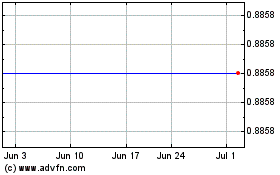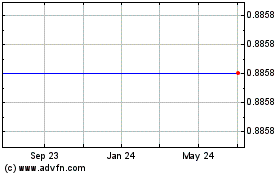By John Letzing and Simon Clark
For ailing banks during the global financial crisis,
sovereign-wealth funds and other investors from the oil-rich Middle
East often played the white knight.
As Europe's banks come under mounting pressure now and their
shares slump, these deep-pocketed investors are unlikely to ride to
their rescue again if capital is needed.
At this point, it is unclear who could take their place.
In 2008, as the crisis brewed, oil prices were reaching new
highs. Global banks, in need of billions of dollars in new
investment, saw an opportunity.
Two of Credit Suisse Group AG's largest investors are now a
Qatari sovereign-wealth fund, and a Saudi conglomerate.
The move wasn't unique. Barclays PLC received investment from
the Qatari and Abu Dhabi sovereign-wealth funds, while UniCredit
SpA got funding from Abu Dhabi-owned Aabar Investments PJS.
Deutsche Bank AG took money from a company owned by a former Qatari
prime minister.
Energy prices have since plummeted, however, squeezing the
fortunes of sovereign-wealth funds and other players in regions
such as the Middle East.
For the big banks that were once propped up by such investors
and have seen their stock prices touch new lows in recent days, the
timing is perilous.
"What happened in 2008 occurred more or less at the time of peak
oil," said Bernardo Bortolotti, director of the Sovereign
Investment Lab at Bocconi University, in Milan. "The banks won't be
able to tap again the huge amount of money from the
sovereign-wealth funds if they need to recapitalize."
Another key difference between now and the crisis era: a much
lower likelihood that domestic governments would be willing to be
the investor of last resort, by bailing out banks.
In Switzerland, Credit Suisse's rival UBS Group AG accepted a
government bailout in 2008. That proved to be widely unpopular and
helped change the political mood in a country where banks have long
played an outsize role in the economy. Since the crisis,
Switzerland has implemented one of the most restrictive sets of
stability rules for its big lenders, which now regularly face
legislative and popular initiatives aimed at curbing their
operations.
Instead of the Swiss government, Credit Suisse turned to the
Middle East to replenish its coffers amid the crisis.
In 2008, the Qatar Investment Authority, a sovereign-wealth
fund, acquired a large stake in Credit Suisse as part of a $9
billion capital injection. Saudi Arabia's Olayan Group, a
manufacturing and investment conglomerate, significantly increased
its stake in the Swiss bank through the same offering. The two
investors remain among the bank's largest backers.
More recently, however, at least one of Credit Suisse's large
backers from the Middle East appears to have stayed on the
sidelines as the bank raised fresh capital to support its strategic
revamp under new Chief Executive Tidjane Thiam.
Credit Suisse said in October it would raise 6 billion Swiss
francs ($6.16 billion). One part of that effort involved a private
placement of 58 million new shares. Backers hoping to maintain the
size of their respective stakes would have to participate.
Not long afterward, in early December, Credit Suisse disclosed
that Olayan Group's stake had fallen to 4.95%, from 6.7% as of the
end of 2014.
A spokesman for Olayan Group declined to comment. A Credit
Suisse spokeswoman also declined to comment.
According to data from a separate December disclosure, the Qatar
Investment Authority registered a 4.98% stake in Credit
Suisse--compared with a figure of 5.2% previously reported as of
the end of 2014.
Credit Suisse, whose shares have fallen more than 17% in the
past week, isn't the only potentially troublesome investment for
the Qatari fund.
Other bets made by the fund include German car maker Volkswagen
AG and Switzerland-based commodities trader Glencore PLC. Shares of
Volkswagen have fallen 47% in the past 12 months, while shares of
Glencore have tumbled 67% in the same period.
A spokesman for the Qatar Investment Authority declined to
comment.
Shares of Credit Suisse started their slide last week, after the
bank rattled investors by posting a large fourth-quarter loss and
raised questions about its ability to weather the current market
turbulence as it tries its costly revamp.
The stock's decline mirrors an 11% drop for European banks this
week.
For sovereign-wealth funds and other big investors from
energy-rich regions, tighter finances aren't the only reason they
may avoid stepping in once again for big banks. Many such investors
now prefer to put their money directly into real estate, experts
say.
Total investment by sovereign-wealth funds in financial firms
slumped 92% between 2008 and 2014, to $6.95 billion, while
real-estate investment almost tripled to $31.5 billion in the same
period, according to Bocconi University's Sovereign Investment
Lab.
In addition, there is a political risk for sovereign-wealth
funds seen propping up big banks with large investments, according
to Patrick Schena, an adjunct professor at the Fletcher School of
Law and Diplomacy at Tufts University.
"There is a very fine line between being an investor of last
resort and being involved in a rescue or bailout," Mr. Schena
said.
Write to John Letzing at john.letzing@wsj.com and Simon Clark at
simon.clark@wsj.com
(END) Dow Jones Newswires
February 11, 2016 16:58 ET (21:58 GMT)
Copyright (c) 2016 Dow Jones & Company, Inc.
Credit Suisse (NYSE:CS)
Historical Stock Chart
From Mar 2024 to Apr 2024

Credit Suisse (NYSE:CS)
Historical Stock Chart
From Apr 2023 to Apr 2024
